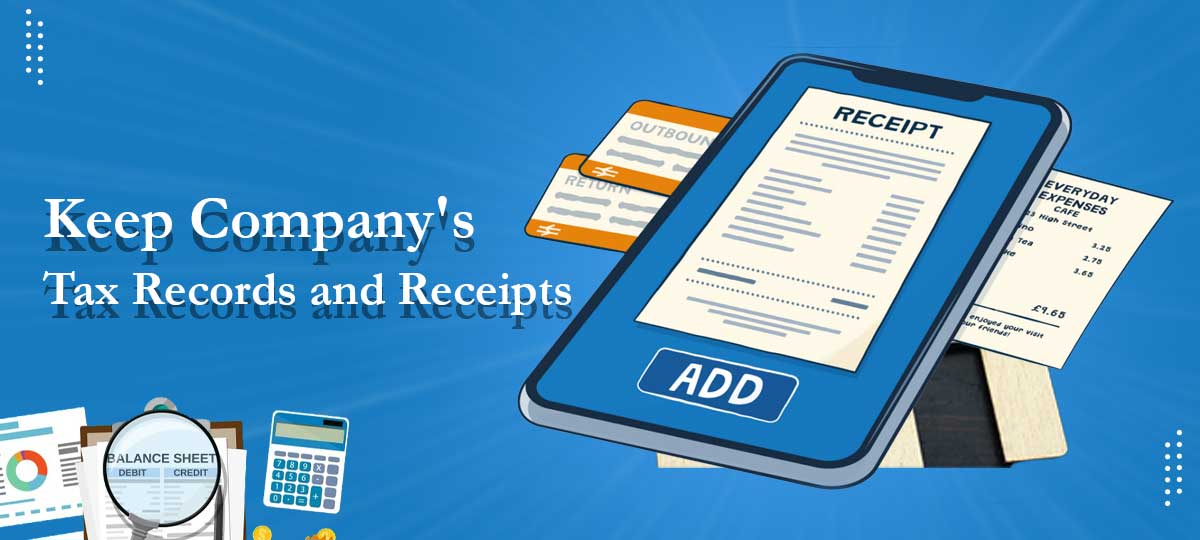To keep company’s tax records and receipts is a big burden and keeping them for a long time to ensure your hurdle free business is a big milestone. Good company recordkeeping allows you to create financial statements, keep track of your spending, and protects you if you're ever sued or audited.
But did you know that the Internal Revenue Service (IRS) also mandates you to keep financial records for your company?
We'll go through the documents you're legally obligated to maintain, how long you should preserve them for, and how to avoid losing them in this tutorial.
How long should you retain your tax records and receipts?
For three years should keep Tax records and receipts in general. However, in rare situations, it may take longer.
Table
The Eight Criteria for Small Company Record Keeping
Bank statements, receipts, invoices, payroll records, income statements, deductions, or credit reports on your tax return should always be kept.
- Must maintain the majority of supporting papers for at least three years.
- Must preserve Records about employment taxes for a minimum of four years.
- Keep records for six years if you excluded money from your return.
- Keep records for seven years if you subtracted the cost of the bad debt or worthless securities.
- Go paperless, save everything online, and create backups at all times.
- Expenses less than $75, or those related to transportation, housing, or meals, may not necessitate a receipt. It would be best if you still informed the IRS where and when the cost happened.
- To file your taxes, you may require it for another reason, even if you don't need a document. Keep it when in doubt.
What Receipts Should I Preserve for Tax Purposes?
As much as they would want to accept your word for it, the IRS requires you to retain paperwork that supports the income, deductions, and credits you declare on your tax return.
The following are the primary sorts of records you should keep:
- Receipts
- Tapes from cash registers
- Information on the deposit (cash and credit sales)
- Invoices
- Checks that have been canceled or other forms of payment/electronic money transfer
- Receipts from credit cards
- Account statements
- Petty cash slips are used to make minor financial payments.
- Accounts payable and receivable are two terms used to describe accounts payable and receivable.
- Payroll documents
- Tax returns
- W2 and 1099 documents from previous tax returns
- Any other documentation proof supports an item of income, deduction, or credit claimed on your tax return.
Although you may not always require them to file your taxes, you should have the following business records on hand:
- Any agreements you've signed (with clients, vendors, contractors, employees.)
- Incorporation articles
- Permits for business
- Documents about the company's health, safety, and any other regulatory requirements
- Reports on an annual basis
Because it is your responsibility to provide evidence to back up every item on your tax return, the ideal strategy for recordkeeping for small businesses is to retain as many documents as possible.
Do you require assistance with your bookkeeping and recordkeeping? Take a look at Bookkeeping pro. We will conduct your bookkeeping and provide you with access to our app, where you may save all of your data.
Is there anything I don't have to keep?
It's impossible to hold on to everything. Receipts are misplaced sometimes, especially for minor expenses.
Can you still deduct such expenditures without a receipt?
Maybe if the cost is less than $75
In general, you may get away with not retaining a document for three reasons:
- The cost is less than $75. (Please keep in mind that this does not relate to hotel expenditures.)
- The cost is for transportation, and obtaining a legitimate receipt is difficult.
- You are reporting accommodation or food costs as part of an accountability plan that includes a per diem allowance.
But Wait, Don't Toss Out That Chipotle Receipt Just Yet!
Even so, you're not entirely off the hook. During an audit, every business deduction on your tax return can be challenged, even if it is less than $75.
For the IRS to accept a deduction of less than $75 without a receipt, you must provide the following information:
- The amount of money spent
- When and where it creates
- The primary nature or purpose of the expenditure
It gets even more complicated when you factor in meals and entertainment. You may be required to give a list of everyone who was there when the cost happened, as well as what you said (yes, the IRS wants to know if you talked shop).
Suppose you deduct many costs under $75 (particularly meals and entertainment).
How Long Do You Have to Keep Your Tax Records?
For The Most Part, For Three Years.
The IRS, you must retain your documents ``for as long as necessary to establish the income or deductions on a tax return." In general, you must preserve your tax records for three years from the date filed the return or from the tax returns the due date (whichever is later).
If you're still unsure about which tiny receipts to preserve, you can check out the IRS's rules for proving to spend under $75 here.
Assume you filed your 2017 tax return on February 10, 2018, two months before the deadline. That means you'd have to preserve the receipts, tax records, and other paperwork associated with the return until April 15, 2021, and three years after the 2017 deadline.
What Is the Significance of Three Years of Keeping Tax Records?
It is primarily due to the Period of Limitations, which is when you can modify your tax return or the IRS can audit your return.
When the statute of limitations on your tax return runs out, you no longer have to maintain the tax return or any supporting paperwork.
The Three-Year Rule Has Certain Exceptions.
In some cases, you will need to keep tax records for more than three years. As an example:
If You Have Personnel Information
You should preserve payroll tax records for at least four years after the payroll taxes are due or paid (whichever is later).
If You Failed to Report Income On Your Tax Return
If you fail to declare money that should have reported and exceeded 25% of your gross income as indicated on your return, preserve records for six years after the date you filed or the due date of the tax return.
If You Deducted the Cost of the Bad Debt or Worthless Securities
You would have kept the documents for seven years in that scenario. If you file a fake return or fail to file a return at all, you will be penalized.
Are you hoping to get away with tax evasion?
There is no statute of limitations on false or unfiled taxes so that the IRS can pursue you indefinitely. Just something to think about!
If You Have Property-Related Records
Any deductions you make relating to your property (depreciation, loss from sale) are subject to a three-year statute of limitations.
However, the time between when you dispose of or sell your property and when you no longer need to preserve those records might occasionally be more significant than three years.
Assume you sell a property during the 2015 tax year, record the financial gain on your 2017 tax return, and file your tax return on or before April 17, 2018. That implies you'd have to maintain property-related data until April 17, 2021.
Deeds, titles, and cost basis documents are typical examples of these records (for instance, receipts for equipment such as computers or vehicles).
Do I Need to Save Paper Bank Statements?
No, if you have internet banking. The digital copy will suffice. If your bank does not provide internet banking, save bank records for three years.
The Most Convenient Method of Keeping Records
According to the IRS, you may use any recording method as long as it "clearly displays your income and spending." Unless you're auditioning for an episode of Hoarders, you should probably go paperless and save everything digitally.
The IRS accepts digital reproductions of papers that are identical to the originals. (This means you must be able to provide them with a printed, legible copy of the document upon request.)
Digitizing your documents is also a fantastic method to prevent unintentionally throwing them away after a move or in a frenzy of spring cleaning.
Not to mention the fact that paper records can fade and become damaged. It's not going to fly to tell the IRS that "the dog ate my tax paperwork."
We propose scanning every document and receipt in your company, labeling it with a descriptive name, and preserving it indefinitely.
Here are some technologies that might help with digital recordkeeping:
- Bookkeeping pro services—you can upload all of your receipts and save them in the QuickBooks app indefinitely.
- Dropbox, Evernote, and Google Drive are examples of secure cloud storage systems. These websites will allow you to scan and save files.
- A specialized corporate document scanner, such as the Kodak Alaris, can process documents at once and the filing process for you.
- Receipt Bank is a specialized receipt app.
When you decide to go paperless, maintain a copy of your papers in a safe second place, such as an encryption key hard drive or a secondary cloud services provider.
I've waited the required amount of time; now, I'm on my way to the landfill to dispose of all of this old tax paperwork. Isn't this all right?
Hold your horses. Although tax season is the most crucial period for company recordkeeping, taxes aren't the only reason you should maintain your records.
Before you trash them, double-check to see whether anybody else with whom you do business needs them. Creditors, company lawyers, and insurance firms may demand that you retain documents for a more extended period than the IRS.
It is simply one more advantage of preserving digital documents. You may archive them forever rather than wondering about whether you should maintain or discard them.
Keep It If You're Unsure.
If you only remember one item from this handbook, make it this guideline.
Suppose you're ever unsure whether or not to keep a document; keep it. Better yet, digitize it. The next time you pay your taxes or get audited, you'll thank yourself.







Be the first one to give the review on this posts